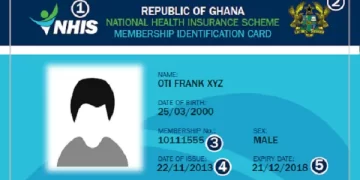Lagos, Nigeria – This Monday, millions of Nigerians woke up to find that they had been barred from making phone calls. The number of disconnected lines is reported to be as many as 75 million, more than a third of the total 198 million lines nationwide.
But the move has been a long time coming.
In December 2020, Abuja issued a directive for all SIM card carriers to link their lines to a unique National Identity Number, citing a need to tackle the plaguing insecurity in the country.
That deadline was postponed numerous times but last week’s attack on a train by armed groups was a wake-up call. When reports started surfacing online that the attackers had started calling families of abducted passengers for ransom, the government swung into action, fulfilling its almost two-year-old promise to cut off non-compliant citizens.
On social networks, many – especially southerners – are debating the connection between SIM card linkage with the national identity number and the actions of these groups, known locally as bandits, whose axes of focus are swaths of the northwest and central Nigeria.
In 2015, the Nigerian government fined MTN, one of the continent’s biggest telecom players, $5.2bn for defaulting in cutting off unverified customers. The National Communications Commission (NCC) had previously instructed the telecom giant to deactivate between 10 and 18.6 million lines. But government swung into action after the high-profile kidnap of a former Nigerian finance minister; police say the kidnappers used MTN lines to contact his family members.
Across the continent, there is a lengthening line of governments embarking on a mass disconnection drive citing, among other things, domestic security. In March, Zambia announced it had deactivated two million SIMs cards to stem the volume of fraud carried out using mobile lines.
Kenyan media have also reported an April 15 deadline by authorities in the East African country for the deactivation of unregistered SIM cards – the third such deadline in the past 10 years. In 2013, it switched off more than two million SIM cards after an attack by the armed group al-Shabab.
Last year, Tanzania said it had blocked 18,000 SIM cards involved in criminal activities. In a bid to also curtail mobile scams, Ghana issued a directive for every SIM card carrier to re-register their SIMs with the Ghana Card, the national residency card, or lose them.
In faraway Hong Kong, a proposal from last year to impose new restrictions on phone line registrations was approved this March.
What are the issues?
With Africa having a 44 percent mobile penetration rate, SIM cards are one of the most ubiquitous technologies around.
At least 50 of Africa’s 54 countries have mandatory SIM registration laws in place, but most have barely been enforced – until now. Registration usually involves the submission of personal data and the capture of citizen biometrics.
The rationale is that this registration will help create a vast database to help track criminal activity. Officials say SIMs, accessible even on the streets for sometimes as low as $1, are frequently bought and discarded by suspected criminals, without any – or not enough – details of their personal identity to trace and monitor them.
“Since 9/11, in many countries, if you want to get a SIM card, you have to show some [form of] identification,” Rebecca Enonchong, Cameroonian tech entrepreneur and founder of AppsTech told Al Jazeera. “It is rather normal that the government should require those who are using cell services [to] register with the operators and the telecommunication companies should know who is connected to their services.”
On the surface, this sounds like a quick and cheap solution for many governments in a continent where most countries have no unified operational national database.
But multiple SIM ownership is prevalent across Africa for many reasons including varying data prices, connectivity speeds and signal strength. In 2018, four African countries were among the top 10 globally, with dual or multi-SIM mobile phones. Kenya even once had plans to institute an ownership cap of 10 SIM cards per person. Telecom operators also often tailor registration processes in order to sell more prepaid SIM cards.
Experts say the outcome is that the data gleaned from SIM registrations are not as accurate or neat as they ought to be.
“The ID systems [in Africa] are not really backed by technology, there are no linkages, so there is no verification process,” Enonchong said. “If the telecommunication companies themselves don’t enforce that, it is really very hard for the government to make use of the data.”
How did we get here?
At the root of it all is a mass unwillingness to register SIM cards due to a seeming lack of distrust by residents to hand over their details to the government.
Unsurprisingly, there are concerns about data privacy and the inestimable capacity of government to use data collected for one purpose for another, given the historical intolerance for dissent in some of these countries.
There is also a legal void around government handling of data.
A 2021 report by Collaboration on International ICT Policy for East and Southern Africa (CIPESA), claimed that only half of African countries have adopted laws to protect personal data.
Repeated registration exercises have also weakened the will of the people, experts say.
Over the years, Nigeria, Africa’s most populous country and its economic powerhouse, has instituted multiple mandatory identity registration schemes, including Bank Verification Number (BVN) and National Identity Number (NIN), alongside more widespread IDs like voters’ cards, international passports and others.
Yet, the government is insisting that the way forward is for every SIM card to be linked with an NIN, a policy that many Nigerians say will be just as cumbersome and bureaucratic as its predecessors – and possibly end up achieving nothing too.
“This is a trend of policy laziness,” Gbenga Sesan, head of Lagos-based digital rights advocacy nonprofit Paradigm Initiative, told Al Jazeera. “The problem does not lie with the lack of a central database; it is about impunity. If I know that if I commit a crime and I know I would be punished for it, then I will likely think about it twice.”
In Kenya, citizens are also complaining about the redundancy of multiple registrations. The new registration warrants the submission of the phone number, copy of passport or visa and biodata page, exit stamps and scanned ID – items they claim to have submitted during the last exercise in 2018.
The bigger fear, however, is of government surveillance under the guise of national security, leading to a widespread reluctance to willingly submit personal data which can be used to monitor their everyday activities.
“The issue of data privacy transcends Africa,” Ken Ashigbey, the CEO of Ghana Telecommunications Chamber, noted. “The concern about Big Brother sitting somewhere and using your data to spy on you is always going to be there, [and] when you bring it into the examples of Africa where our governments all seem to have total power, definitely there are risks,” he said.
The risks also extend to small and medium-scale enterprises (SMEs) in a digital era where SIMs and the world of possibilities on the internet are helping empower many in the absence of social welfare schemes.
Already, SMEs account for 84 percent of employment and make up 96 percent of businesses in Nigeria. Shutting millions of people out of seamless communication could adversely affect the economy, Sesan warned.
“What we are going to lose is roughly one-third or about 35 percent of connected lines that we have [and] there will be major economic consequences [but] there will be no gain in terms of security,” he said.
Read Also: Serve ‘double-salaried’ MPs with writ via substituted service – Supreme Court orders
SOURCE: AL JAZEERA


























